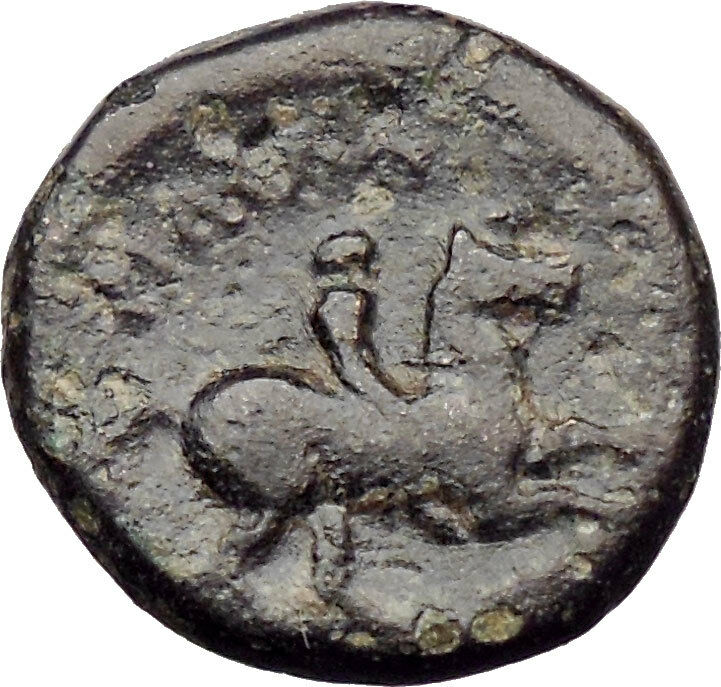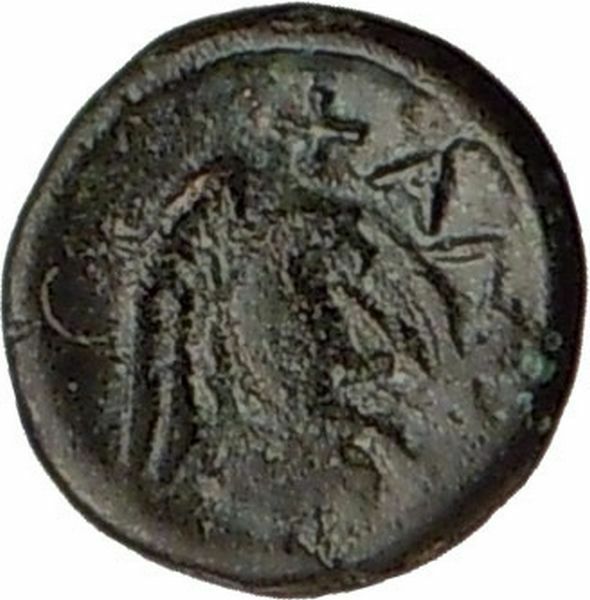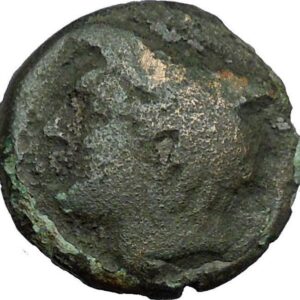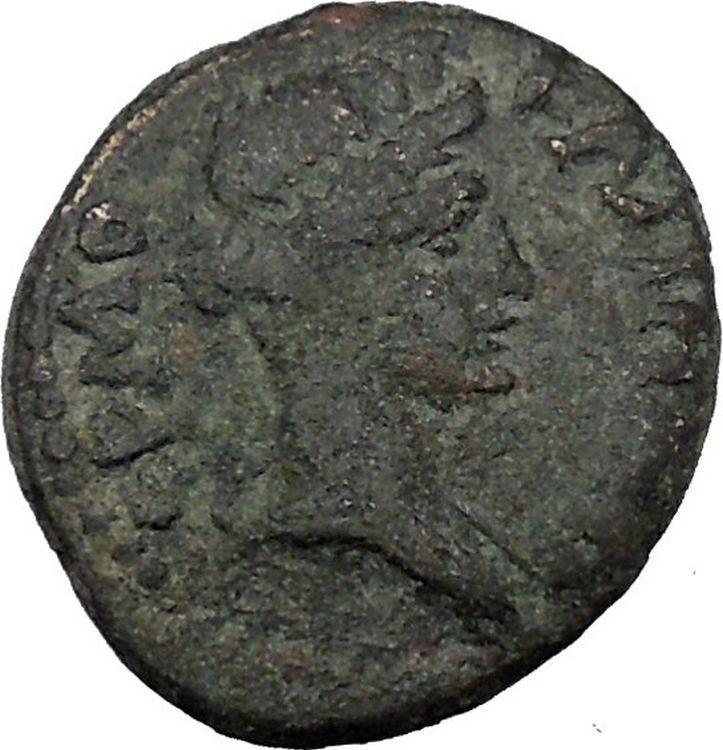|
Lysimachos – King of Thrace, Asia Minor and Macedonia: 323-281 B.C. –
Bronze 16mm (2.97 grams) Struck circa 323-281 B.C.
Reference: Possibly Unpublished!
Head of lion right.
ΛY / ΣI above and below grain-ear.
* Numismatic Note: I was unable to locate a similar example
anywhere of this ruler. May be an unpublished, very rare, even unique variety!
One of the most remarkable of the ‘Successors’ of Alexander, Lysimachos was
of Thessalian stock and was a bodyguard of the great Macedonian King. In the
confused period following Alexander’s death he obtained the government of
Thrace, and in 309 B.C. founded his capital city of Lysimacheia where many of
his coins were struck. In 305 B.C. he took the title of King, and four years
later extended his rule over much of Asia Minor following the defeat of
Antigonos the One-eyed at Ipos. His later years were marred by domestic tragedy
and his harsh rule made him unpopular with his subjects. In 281 B.C. Lysimachos,
now aged 80, was attacked by Seleukos of Syria who was only two years his
junior. Lysimachos died fighting at the battle of Korupedion and his kingdom
disappeared with him. But his memory lived on and generations later a number of
mints in the Black Sea area restored his coin types for their autonomous issues.
You are bidding on the exact item pictured,
provided with a Certificate of Authenticity and Lifetime Guarantee of
Authenticity.
Alexander III of Macedon, popularly known to history as Alexander
the Great,
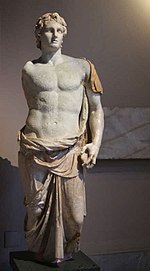
(“Mégas Aléxandros“)
was an
Ancient Greek
king (basileus)
of
Macedon
. Born in 356 BC, Alexander succeeded his father
Philip II of Macedon
to the throne in 336 BC, and died in
Bablyon
in 323 BC at the age of 32.
Alexander was one of the most successful military commanders of all time and
it is presumed that he was undefeated in battle. By the time of his death, he
had conquered the
Achaemenid Persian Empire
, adding it to Macedon’s European territories;
according to some modern writers, this was much of the world then known to the
ancient Greeks (the ‘Ecumene‘).
His father, Philip, had unified most of the
city-states
of mainland Greece under Macedonian
hegemony
in
the
League of Corinth
. As well as inheriting hegemony over the Greeks, Alexander
also inherited the Greeks’ long-running feud with the
Achaemenid Empire
of
Persia
. After reconfirming Macedonian rule by quashing a rebellion of
southern Greek city-states, Alexander launched a short but successful campaign
against Macedon’s northern neighbours. He was then able to turn his attention
towards the east and the Persians. In a
series of campaigns
lasting 10 years, Alexander’s armies repeatedly defeated
the Persians in battle, in the process conquering the entirety of the Empire. He
then, following his desire to reach the ‘ends of the world and the Great Outer
Sea’, invaded India, but was eventually forced to turn back by the near-mutiny
of his troops.
Alexander died after twelve years of constant military campaigning, possibly
a result of malaria
, poisoning
,
typhoid fever
, viral
encephalitis
or the consequences of alcoholism. His legacy and conquests
lived on long after him and ushered in centuries of Greek settlement and
cultural influence over distant areas. This period is known as the
Hellenistic period
, which featured a combination of
Greek
,
Middle
Eastern
and
Indian culture
. Alexander himself featured prominently in the history and
myth of both Greek and non-Greek cultures. His exploits inspired a literary
tradition in which he appeared as a legendary
hero in the
tradition of Achilles
.

Alexander fighting Persian king Darius III. From Alexander
Mosaic, from Pompeii, Naples, Naples National
Lysimachus (Greek:
Λυσίμαχος, Lysimachos; 360 BCE – 281 BCE) was a
Macedonian
officer and
diadochus
(i.e. “successor”) of
Alexander the Great
, who became a
basileus
(“king”) in 306 BCE, ruling
Thrace
,
Asia Minor
and
Macedonia
.
//
Early
career
Lysimachus was born in 362/361 BC, the son of the
Thessalian
Agathocles from
Crannon
. He was granted citizenship in
Macedon
and was educated at the court in
Pella
. He was
probably appointed
Somatophylax
during the reign of Philip II.
During Alexander’s
Persian
campaigns, he was one of his immediate bodyguards. In
324 BCE
, in Susa, he was crowned in recognition for his actions in India.
After Alexander’s death in 323 BCE, he was appointed to the government of Thrace
as strategos
.
Diadochi
In 315 BCE, he joined
Cassander
,
Ptolemy
and
Seleucus
against
Antigonus
, who, however, diverted his attention by stirring up Thracian and
Scythian
tribes against him. In 309 BCE, he founded
Lysimachia
in a commanding situation on the neck connecting the Chersonese
with the mainland. He followed the example of Antigonus in taking the title of
king.
In 306 or 305, he assumed the title of “King”, which he held until his death
at Corupedium in 282/1.
In 302, when the second affiance between Cassander, Ptolemy and
Seleucus was made, Lysimachus, reinforced by troops from Cassander, entered Asia
Minor, where he met with little resistance. On the approach of Antigonus he
retired into winter quarters near
Heraclea
, marrying its widowed queen
Amastris
, a
Persian princess. Seleucus joined him in 301 BCE, and at the
battle of Ipsus
Antigonus was defeated and slain. His dominions were divided
among the victors. Lysimachus share was
Lydia
,
Ionia
,
Phrygia
and
the north coast of Asia Minor.
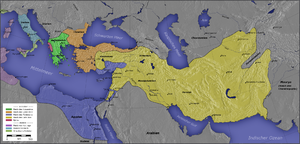
Kingdom of Lysimachus Other
diadochi
Kingdom of
Cassander
Kingdom of
Seleucus_I_Nicator
Kingdom of
Ptolemy
Epirus
Other
Carthage
Rome
Greek
colonies
Feeling that Seleucus was becoming dangerously great, Lysimachus now allied
himself with Ptolemy, marrying his daughter
Arsinoe II of Egypt
. Amastris, who had divorced herself from him, returned
to Heraclea. When Antigonus’s son
Demetrius I of Macedon
renewed hostilities (297 BCE), during his absence in
Greece
,
Lysimachus seized his towns in Asia Minor, but in 294 BCE concluded a peace
whereby Demetrius was recognized as ruler of
Macedonia
. He tried to carry his power beyond the
Danube
, but was
defeated and taken prisoner by the
Getae
king
Dromichaetes
(Dromihete),
who, however, set him free on amicable terms. Demetrius subsequently threatened
Thrace, but had to retire due to a sudden uprising in
Boeotia
, and
an attack from the king
Pyrrhus
of Epirus
.
In 288 BCE, Lysimachus and
Pyrrhus
in turn invaded
Macedonia
, and drove Demetrius out of the country. Lysimachus left
Pyrrhus
in possession of
Macedonia
with the title of king for around seven months before Lysimachus
invaded. For a short while the two ruled jointly but in 285 BCE Lysimachus
expelled Pyrrhus.
Later
years
Domestic troubles embittered the last years of Lysimachus’s life. Amastris
had been murdered by her two sons; Lysimachus treacherously put them to death.
On his return Arsinoe asked the gift of Heraclea, and he granted her request,
though he had promised to free the city. In 284 BCE Arsinoe, desirous of gaining
the succession for her sons in preference to
Agathocles
(the eldest son of Lysimachus), intrigued against him with the
help of her brother
Ptolemy Keraunos
; they accused him of conspiring with Seleucus to seize the
throne, and he was put to death.
This atrocious deed of Lysimachus aroused great indignation. Many of the
cities of Asia revolted, and his most trusted friends deserted him. The widow of
Agathocles fled to Seleucus, who at once invaded the territory of Lysimachus in
Asia. In 281 BCE, Lysimachus crossed the
Hellespont
into Lydia
, and at the decisive
Battle of Corupedium
was killed. After some days his body was found on the
field, protected from birds of prey by his faithful dog.
Lysimachus’s body was given over to his son
Alexander
, by whom it was interred at
Lysymachia
.
|








